- Home
- Alexandre Dumas
Ten Years Later
Ten Years Later Read online
Produced by An Anonymous Volunteer
TEN YEARS LATER
by Alexandre Dumas
THE VICOMTE DE BRAGELONNE.
Volume I.
CHAPTER 1. The Letter.
Towards the middle of the month of May, in the year 1660, at nineo'clock in the morning, when the sun, already high in the heavens, wasfast absorbing the dew from the ramparts of the castle of Blois a littlecavalcade, composed of three men and two pages, re-entered the city bythe bridge, without producing any other effect upon the passengers ofthe quay beyond a first movement of the hand to the head, as a salute,and a second movement of the tongue to express, in the purest Frenchthen spoken in France: "There is Monsieur returning from hunting." Andthat was all.
Whilst, however, the horses were climbing the steep acclivity whichleads from the river to the castle, several shop-boys approached thelast horse, from whose saddle-bow a number of birds were suspended bythe beak.
On seeing this, the inquisitive youths manifested with rustic freedomtheir contempt for such paltry sport, and, after a dissertation amongthemselves upon the disadvantages of hawking, they returned to theiroccupations; one only of the curious party, a stout, stubby, cheerfullad, having demanded how it was that Monsieur, who, from his greatrevenues, had it in his power to amuse himself so much better, could besatisfied with such mean diversions.
"Do you not know," one of the standers-by replied, "that Monsieur'sprincipal amusement is to weary himself?"
The light-hearted boy shrugged his shoulders with a gesture which saidas clear as day: "In that case I would rather be plain Jack than aprince." And all resumed their labors.
In the meanwhile, Monsieur continued his route with an air at once somelancholy and so majestic, that he certainly would have attracted theattention of spectators, if spectators there had been; but the goodcitizens of Blois could not pardon Monsieur for having chosen their gaycity for an abode in which to indulge melancholy at his ease, and asoften as they caught a glimpse of the illustrious ennuye, they stoleaway gaping, or drew back their heads into the interior of theirdwellings, to escape the soporific influence of that long pale face, ofthose watery eyes, and that languid address; so that the worthy princewas almost certain to find the streets deserted whenever he chanced topass through them.
Now, on the part of the citizens of Blois this was a culpable piece ofdisrespect, for Monsieur was, after the king--nay, even, perhaps beforethe king--the greatest noble of the kingdom. In fact, God, who hadgranted to Louis XIV., then reigning, the honor of being son of LouisXIII., had granted to Monsieur the honor of being son of Henry IV. Itwas not then, or, at least it ought not to have been, a trifling sourceof pride for the city of Blois, that Gaston of Orleans had chosen it ashis residence, and he his court in the ancient castle of its states.
But it was the destiny of this great prince to excite the attention andadmiration of the public in a very modified degree wherever he might be.Monsieur had fallen into this situation by habit.
It was not, perhaps, this which gave him that air of listlessness.Monsieur had been tolerably busy in the course of his life. A man cannotallow the heads of a dozen of his best friends to be cut off withoutfeeling a little excitement, and as, since the accession of Mazarin topower, no heads had been cut off, Monsieur's occupation was gone, andhis morale suffered from it.
The life of the poor prince was, then, very dull. After his littlemorning hawking-party on the banks of the Beuvion, or in the woods ofChiverny, Monsieur crossed the Loire, went to breakfast at Chambord,with or without an appetite and the city of Blois heard no more of itssovereign lord and master till the next hawking-day.
So much for the ennui extra muros; of the ennui of the interior we willgive the reader an idea if he will with us follow the cavalcade to themajestic porch of the castle of the states.
Monsieur rode a little steady-paced horse, equipped with a large saddleof red Flemish velvet, with stirrups in the shape of buskins; the horsewas of a bay color; Monsieur's pourpoint of crimson velvet correspondedwith the cloak of the same shade and the horse's equipment, and it wasonly by this red appearance of the whole that the prince could be knownfrom his two companions, the one dressed in violet, the other in green.He on the left, in violet, was his equerry; he on the right, in green,was the grand veneur.
One of the pages carried two gerfalcons upon a perch, the other ahunting-horn, which he blew with a careless note at twenty paces fromthe castle. Every one about this listless prince did what he had to dolistlessly.
At this signal, eight guards, who were lounging in the sun in the squarecourt, ran to their halberts, and Monsieur made his solemn entry intothe castle.
When he had disappeared under the shades of the porch, three or fouridlers, who had followed the cavalcade to the castle, after pointingout the suspended birds to each other, dispersed with comments upon whatthey saw: and, when they were gone, the street, the place, and the courtall remained deserted alike.
Monsieur dismounted without speaking a word, went straight to hisapartments, where his valet changed his dress, and as Madame had notyet sent orders respecting breakfast, Monsieur stretched himself upona chaise longue, and was soon as fast asleep as if it had been eleveno'clock at night.
The eight guards, who concluded their service for the day was over, laidthemselves down very comfortably in the sun upon some stone benches;the grooms disappeared with their horses into the stables, and, with theexception of a few joyous birds, startling each other with their sharpchirping in the tufted shrubberies, it might have been thought that thewhole castle was as soundly asleep as Monsieur was.
All at once, in the midst of this delicious silence, there resoundeda clear ringing laugh, which caused several of the halberdiers in theenjoyment of their siesta to open at least one eye.
This burst of laughter proceeded from a window of the castle, visitedat this moment by the sun, that embraced it in one of those largeangles which the profiles of the chimneys mark out upon the walls beforemid-day.
The little balcony of wrought iron which advanced in front of thiswindow was furnished with a pot of red gilliflowers, another pot ofprimroses, and an early rose-tree, the foliage of which, beautifullygreen, was variegated with numerous red specks announcing future roses.
In the chamber lighted by this window was a square table, covered withan old large-flowered Haarlem tapestry; in the center of this tablewas a long-necked stone bottle, in which were irises and lilies of thevalley; at each end of this table was a young girl.
The position of these two young people was singular; they might havebeen taken for two boarders escaped from a convent. One of them, withboth elbows on the table, and a pen in her hand, was tracing charactersupon a sheet of fine Dutch paper; the other, kneeling upon a chair,which allowed her to advance her head and bust over the back of it tothe middle of the table, was watching her companion as she wrote, orrather hesitated to write.
Thence the thousand cries, the thousand railleries, the thousand laughs,one of which, more brilliant than the rest, had startled the birds inthe gardens, and disturbed the slumbers of Monsieur's guards.
We are taking portraits now; we shall be allowed, therefore, we hope, tosketch the two last of this chapter.
The one who was leaning in the chair--that is to say, the joyous, thelaughing one--was a beautiful girl of from eighteen to twenty, withbrown complexion and brown hair, splendid, from eyes which sparkledbeneath strongly-marked brows, and particularly from her teeth, whichseemed to shine like pearls between her red coral lips. Her everymovement seemed the accent of a sunny nature, she did not walk--shebounded.
The other, she who was writing, looked at her turbulent companion withan eye as limpid, as pure, and as blue as the azure of the day. Herhair, of a shaded f
airness, arranged with exquisite taste, fell in silkycurls over her lovely mantling cheeks; she passed across the paper adelicate hand, whose thinness announced her extreme youth. At each burstof laughter that proceeded from her friend, she raised, as if annoyed,her white shoulders in a poetical and mild manner, but they were wantingin that richfulness of mold which was likewise to be wished in her armsand hands.
"Montalais! Montalais!" said she at length, in a voice soft andcaressing as a melody, "you laugh too loud--you laugh like a man! Youwill not only draw the attention of messieurs the guards, but you willnot hear Madame's bell when Madame rings."
This admonition neither made the young girl called Montalais cease tolaugh and gesticulate. She only replied: "Louise, you do not speak asyou think, my dear; you know that messieurs the guards, as you callthem, have only just commenced their sleep, and that a cannon would notwaken them; you know that Madame's bell can be heard at the bridgeof Blois, and that consequently I shall hear it when my services arerequired by Madame. What annoys you, my child, is that I laugh while youare writing; and what you are afraid of is that Madame de Saint-Remy,your mother, should come up here, as she does sometimes when we laughtoo loud, that she should surprise us, and that she should see thatenormous sheet of paper upon which, in a quarter of an hour, you haveonly traced the words Monsieur Raoul. Now, you are right, my dearLouise, because after these words, 'Monsieur Raoul,' others may be putso significant and so incendiary as to cause Madame de Saint-Remy toburst out into fire and flames! Hein! is not that true now?--say."
And Montalais redoubled her laughter and noisy provocations.
The fair girl at length became quite angry; she tore the sheet of paperon which, in fact, the words "Monsieur Raoul" were written in goodcharacters, and crushing the paper in her trembling hands, she threw itout of the window.
"There! there!" said Mademoiselle de Montalais; "there is our littlelamb, our gentle dove, angry! Don't be afraid, Louise--Madame deSaint-Remy will not come; and if she should, you know I have a quickear. Besides, what can be more permissible than to write to an oldfriend of twelve years' standing, particularly when the letter beginswith the words 'Monsieur Raoul'?"
"It is all very well--I will not write to him at all," said the younggirl.
"Ah, ah! in good sooth, Montalais is properly punished," cried thejeering brunette, still laughing. "Come, come! let us try another sheetof paper, and finish our dispatch off-hand. Good! there is the bellringing now. By my faith, so much the worse! Madame must wait, or elsedo without her first maid of honor this morning."
A bell, in fact, did ring; it announced that Madame had finished hertoilette, and waited for Monsieur to give her his hand, and conduct herfrom the salon to the refectory.
This formality being accomplished with great ceremony, the husband andwife breakfasted, and then separated till the hour of dinner, invariablyfixed at two o'clock.
The sound of this bell caused a door to be opened in the offices on theleft hand of the court, from which filed two maitres d'hotel followed byeight scullions bearing a kind of hand-barrow loaded with dishes undersilver covers.
One of the maitres d'hotel, the first in rank, touched one of theguards, who was snoring on his bench, slightly with his wand; he evencarried his kindness so far as to place the halbert which stood againstthe wall in the hands of the man stupid with sleep, after which thesoldier, without explanation, escorted the viande of Monsieur to therefectory, preceded by a page and the two maitres d'hotel.
Wherever the viande passed, the soldiers ported arms.
Mademoiselle de Montalais and her companion had watched from theirwindow the details of this ceremony, to which, by the bye, they musthave been pretty well accustomed. But they did not look so much fromcuriosity as to be assured they should not be disturbed. So guards,scullions, maitres d'hotel, and pages having passed, they resumed theirplaces at the table; and the sun, which, through the window-frame, hadfor an instant fallen upon those two charming countenances, now onlyshed its light upon the gilliflowers, primroses, and rosetree.
"Bah!" said Mademoiselle de Montalais, taking her place again; "Madamewill breakfast very well without me!"
"Oh! Montalais, you will be punished!" replied the other girl, sittingdown quietly in hers.
"Punished, indeed!--that is to say, deprived of a ride! That is justthe way in which I wish to be punished. To go out in the grand coach,perched upon a doorstep; to turn to the left, twist round to the right,over roads full of ruts, where we cannot exceed a league in two hours;and then to come back straight towards the wing of the castle in whichis the window of Mary de Medici, so that Madame never fails to say:'Could one believe it possible that Mary de Medici should have escapedfrom that window--forty-seven feet high? The mother of two princes andthree princesses!' If you call that relaxation, Louise, all I ask is tobe punished every day; particularly when my punishment is to remain withyou and write such interesting letters as we write!"
"Montalais! Montalais! there are duties to be performed."
"You talk of them very much at your ease, dear child!--you, who are leftquite free amidst this tedious court. You are the only person that reapsthe advantages of them without incurring the trouble,--you, who arereally more one of Madame's maids of honor than I am, because Madamemakes her affection for your father-in-law glance off upon you; so thatyou enter this dull house as the birds fly into yonder court, inhalingthe air, pecking the flowers, picking up the grain, without having theleast service to perform, or the least annoyance to undergo. And youtalk to me of duties to be performed! In sooth, my pretty idler, whatare your own proper duties, unless to write to the handsome Raoul? Andeven that you don't do; so that it looks to me as if you likewise wererather negligent of your duties!"
Louise assumed a serious air, leant her chin upon her hand, and, in atone full of candid remonstrance, "And do you reproach me with my goodfortune?" said she. "Can you have the heart to do it? You have a future;you belong to the court; the king, if he should marry, will requireMonsieur to be near his person; you will see splendid fetes; you willsee the king, who they say is so handsome, so agreeable!"
"Ay, and still more, I shall see Raoul, who attends upon M. le Prince,"added Montalais, maliciously.
"Poor Raoul!" sighed Louise.
"Now is the time to write to him, my pretty dear! Come, begin again,with that famous 'Monsieur Raoul' which figures at the top of the poortorn sheet."
She then held the pen toward her, and with a charming smile encouragedher hand, which quickly traced the words she named.
"What next?" asked the younger of the two girls.
"Why, now write what you think, Louise," replied Montalais.
"Are you quite sure I think of anything?"
"You think of somebody, and that amounts to the same thing, or rathereven more."
"Do you think so, Montalais?"
"Louise, Louise, your blue eyes are as deep as the sea I saw at Boulognelast year! No, no, I mistake--the sea is perfidious: your eyes are asdeep as the azure yonder--look!--over our heads!"
"Well, since you can read so well in my eyes, tell me what I am thinkingabout, Montalais."
"In the first place, you don't think Monsieur Raoul; you think My dearRaoul."
"Oh!----"
"Never blush for such a trifle as that! 'My dear Raoul,' we willsay--'You implore me to write to you at Paris, where you are detained byyour attendance on M. le Prince. As you must be very dull there, to seekfor amusement in the remembrance of a provinciale----'"
Louise rose up suddenly. "No, Montalais," said she, with a smile; "Idon't think a word of that. Look, this is what I think;" and she seizedthe pen boldly and traced, with a firm hand, the following words:--
"I should have been very unhappy if your entreaties to obtain aremembrance of me had been less warm. Everything here reminds me of ourearly days, which so quickly passed away, which so delightfully flew by,that no others will ever replace the charm of them in my heart."
Montalais, who watched
the flying pen, and read, the wrong way upwards,as fast as her friend wrote, here interrupted by clapping her hands."Capital!" cried she; "there is frankness--there is heart--there isstyle! Show these Parisians, my dear, that Blois is the city for finelanguage!"
"He knows very well that Blois was a Paradise to me," replied the girl.
"That is exactly what you mean to say; and you speak like an angel."
"I will finish, Montalais," and she continued as follows: "You oftenthink of me, you say, Monsieur Raoul: I thank you; but that does notsurprise me, when I recollect how often our hearts have beaten close toeach other."
"Oh! oh!" said Montalais. "Beware; my lamb! You are scattering yourwool, and there are wolves about."
Louise was about to reply, when the gallop of a horse resounded underthe porch of the castle.
"What is that?" said Montalais, approaching the window. "A handsomecavalier, by my faith!"
"Oh!--Raoul!" exclaimed Louise, who had made the same movement as herfriend, and, becoming pale as death, sunk back beside her unfinishedletter.
"Now, he is a clever lover, upon my word!" cried Montalais; "he arrivesjust at the proper moment."
"Come in, come in, I implore you!" murmured Louise.
"Bah! he does not know me. Let me see what he has come here for."
CHAPTER 2. The Messenger.

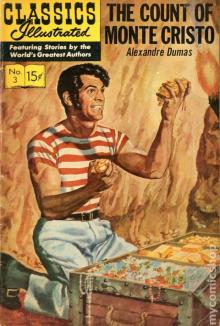 The Count of Monte Cristo, Illustrated
The Count of Monte Cristo, Illustrated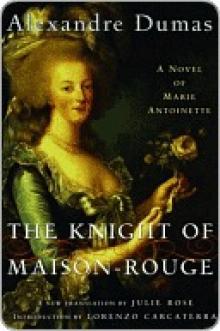 Knight of Maison-Rouge
Knight of Maison-Rouge![The Three Musketeers - Alexandre Dumas - [Full Version] - (ANNOTATED) Read online](http://i1.bookreadfree.com/14/the_three_musketeers_-_alexandre_dumas_-_[full_version]_-_annotated_preview.jpg) The Three Musketeers - Alexandre Dumas - [Full Version] - (ANNOTATED)
The Three Musketeers - Alexandre Dumas - [Full Version] - (ANNOTATED)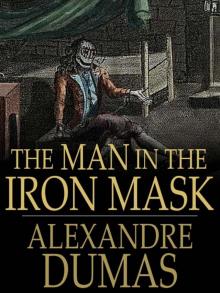 The Man in the Iron Mask
The Man in the Iron Mask The Count of Monte Cristo (Penguin Classics eBook)
The Count of Monte Cristo (Penguin Classics eBook)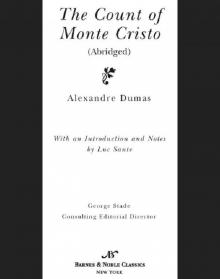 Count of Monte Cristo (abridged) (Barnes & Noble Classics Series)
Count of Monte Cristo (abridged) (Barnes & Noble Classics Series) The Women's War
The Women's War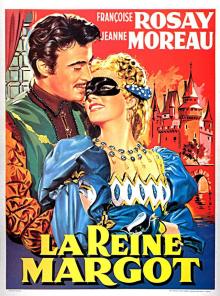 La reine Margot. English
La reine Margot. English The Vicomte de Bragelonne
The Vicomte de Bragelonne__english_preview.jpg) La dame aux camélias (Novel). English
La dame aux camélias (Novel). English The Count of Monte Cristo
The Count of Monte Cristo Balsamo, the Magician; or, The Memoirs of a Physician
Balsamo, the Magician; or, The Memoirs of a Physician Ten Years Later
Ten Years Later The Romance of Violette
The Romance of Violette The Mesmerist's Victim
The Mesmerist's Victim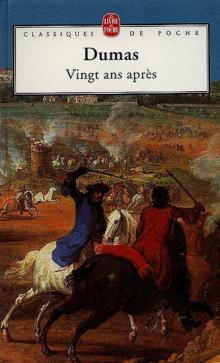 Vingt ans après. English
Vingt ans après. English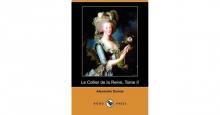 Le collier de la reine. English
Le collier de la reine. English Taking the Bastile; Or, Pitou the Peasant
Taking the Bastile; Or, Pitou the Peasant The Hero of the People: A Historical Romance of Love, Liberty and Loyalty
The Hero of the People: A Historical Romance of Love, Liberty and Loyalty Louise de la Valliere
Louise de la Valliere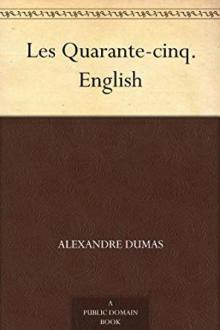 Les Quarante-cinq. English
Les Quarante-cinq. English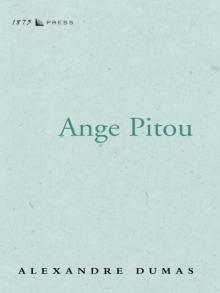 Ange Pitou (Volume 1)
Ange Pitou (Volume 1) The Royal Life Guard; or, the flight of the royal family.
The Royal Life Guard; or, the flight of the royal family.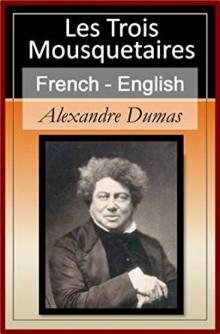 Les trois mousquetaires. English
Les trois mousquetaires. English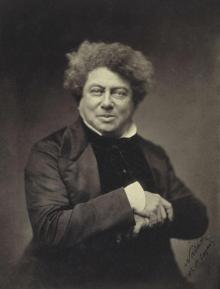 Une fille du régent. English
Une fille du régent. English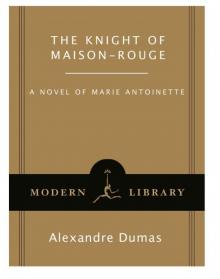 The Knight of Maison-Rouge
The Knight of Maison-Rouge The Count of Monte Cristo (Unabridged Penguin)
The Count of Monte Cristo (Unabridged Penguin) Ange Pitou
Ange Pitou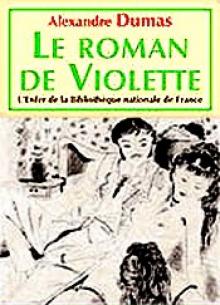 The Romance of Violette (vintage erotica)
The Romance of Violette (vintage erotica) The Three Musketeers
The Three Musketeers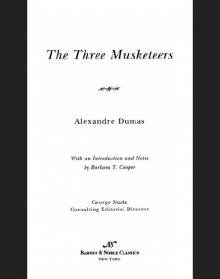 Three Musketeers (Barnes & Noble Classics Series)
Three Musketeers (Barnes & Noble Classics Series)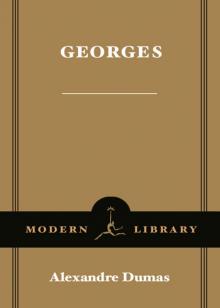 Georges
Georges Man in the Iron Mask (Barnes & Noble Classics Series)
Man in the Iron Mask (Barnes & Noble Classics Series) The Red Sphinx
The Red Sphinx